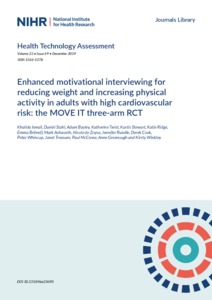Ismail, K;
Stahl, D;
Bayley, A;
Twist, K;
Stewart, K;
Ridge, K;
Britneff, E;
Ashworth, M;
de Zoysa, N;
Rundle, J;
et al.
Ismail, K; Stahl, D; Bayley, A; Twist, K; Stewart, K; Ridge, K; Britneff, E; Ashworth, M; de Zoysa, N; Rundle, J; Cook, D; Whincup, P; Treasure, J; McCrone, P; Greenough, A; Winkley, K
(2019)
Enhanced motivational interviewing for reducing weight and increasing physical activity in adults with high cardiovascular risk: the MOVE IT three-arm RCT.
Health Technol Assess, 23 (69).
pp. 1-144.
ISSN 2046-4924
https://doi.org/10.3310/hta23690
SGUL Authors: Whincup, Peter Hynes
![[img]](https://openaccess.sgul.ac.uk/111543/1.hassmallThumbnailVersion/3031295.pdf)  Preview |
|
PDF
Published Version
Available under License ["licenses_description_publisher" not defined].
Download (1MB)
| Preview
|
Abstract
BACKGROUND: Motivational interviewing (MI) enhanced with behaviour change techniques (BCTs) and deployed by health trainers targeting multiple risk factors for cardiovascular disease (CVD) may be more effective than interventions targeting a single risk factor. OBJECTIVES: The clinical effectiveness and cost-effectiveness of an enhanced lifestyle motivational interviewing intervention for patients at high risk of CVD in group settings versus individual settings and usual care (UC) in reducing weight and increasing physical activity (PA) were tested. DESIGN: This was a three-arm, single-blind, parallel randomised controlled trial. SETTING: A total of 135 general practices across all 12 South London Clinical Commissioning Groups were recruited. PARTICIPANTS: A total of 1742 participants aged 40-74 years with a ≥ 20.0% risk of a CVD event in the following 10 years were randomised. INTERVENTIONS: The intervention was designed to integrate MI and cognitive-behavioural therapy (CBT), delivered by trained healthy lifestyle facilitators in 10 sessions over 1 year, in group or individual format. The control group received UC. RANDOMISATION: Simple randomisation was used with computer-generated randomisation blocks. In each block, 10 participants were randomised to the group, individual or UC arm in a 4 : 3 : 3 ratio. Researchers were blind to the allocation. MAIN OUTCOME MEASURES: The primary outcomes are change in weight (kg) from baseline and change in PA (average number of steps per day over 1 week) from baseline at the 24-month follow-up, with an interim follow-up at 12 months. An economic evaluation estimates the relative cost-effectiveness of each intervention. Secondary outcomes include changes in low-density lipoprotein cholesterol and CVD risk score. RESULTS: The mean age of participants was 69.75 years (standard deviation 4.11 years), 85.5% were male and 89.4% were white. At the 24-month follow-up, the group and individual intervention arms were not more effective than UC in increasing PA [mean 70.05 steps, 95% confidence interval (CI) -288 to 147.9 steps, and mean 7.24 steps, 95% CI -224.01 to 238.5 steps, respectively] or in reducing weight (mean -0.03 kg, 95% CI -0.49 to 0.44 kg, and mean -0.42 kg, 95% CI -0.93 to 0.09 kg, respectively). At the 12-month follow-up, the group and individual intervention arms were not more effective than UC in increasing PA (mean 131.1 steps, 95% CI -85.28 to 347.48 steps, and mean 210.22 steps, 95% CI -19.46 to 439.91 steps, respectively), but there were reductions in weight for the group and individual intervention arms compared with UC (mean -0.52 kg, 95% CI -0.90 to -0.13 kg, and mean -0.55 kg, 95% CI -0.95 to -0.14 kg, respectively). The group intervention arm was not more effective than the individual intervention arm in improving outcomes at either follow-up point. The group and individual interventions were not cost-effective. CONCLUSIONS: Enhanced MI, in group or individual formats, targeted at members of the general population with high CVD risk is not effective in reducing weight or increasing PA compared with UC. Future work should focus on ensuring objective evidence of high competency in BCTs, identifying those with modifiable factors for CVD risk and improving engagement of patients and primary care. TRIAL REGISTRATION: Current Controlled Trials ISRCTN84864870. FUNDING: This project was funded by the National Institute for Health Research (NIHR) Health Technology Assessment programme and will be published in full in Health Technology Assessment; Vol. 23, No. 69. See the NIHR Journals Library website for further project information. This research was part-funded by the NIHR Biomedical Research Centre at South London and Maudsley NHS Foundation Trust and King's College London.
| Item Type: |
Article
|
| Additional Information: |
© Queen’s Printer and Controller of HMSO 2019. This work was produced by Ismail et al. under the terms of a commissioning contract issued by the Secretary of State for Health and Social Care. This issue may be freely reproduced for the purposes of private research and study and extracts (or indeed, the full report) may be included in professional journals provided that suitable acknowledgement is made and the reproduction is not associated with any form of advertising. Applications for commercial reproduction should be addressed to: NIHR Journals Library, National Institute for Health Research, Evaluation, Trials and Studies Coordinating Centre, Alpha House, University of Southampton Science Park, Southampton SO16 7NS, UK. |
| Keywords: |
CARDIOVASCULAR DISEASE, COGNITIVE–BEHAVIOURAL THERAPY, LIFESTYLE INTERVENTION, MOTIVATIONAL INTERVIEWING, PHYSICAL ACTIVITY, PRIMARY HEALTH CARE, WEIGHT LOSS, 1117 Public Health and Health Services, 0807 Library and Information Studies, 0806 Information Systems, Health Policy & Services |
| SGUL Research Institute / Research Centre: |
Academic Structure > Population Health Research Institute (INPH) |
| Journal or Publication Title: |
Health Technol Assess |
| ISSN: |
2046-4924 |
| Language: |
eng |
| Dates: |
| Date | Event |
|---|
| December 2019 | Published | | September 2018 | Accepted |
|
| Projects: |
|
| PubMed ID: |
31858966 |
 |
Go to PubMed abstract |
| URI: |
https://openaccess.sgul.ac.uk/id/eprint/111543 |
| Publisher's version: |
https://doi.org/10.3310/hta23690 |
Statistics
Item downloaded times since 06 Jan 2020.
Actions (login required)
 |
Edit Item |



